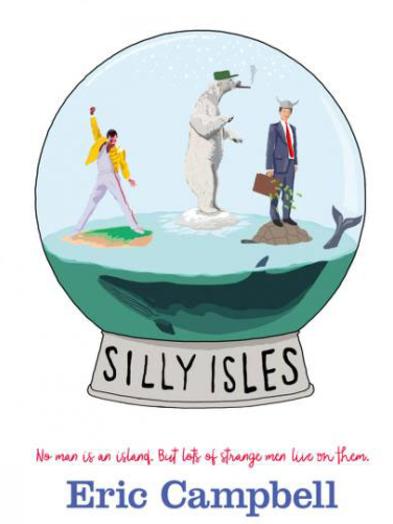Eric Campbell’s Silly Isles: treasured islands and bloody archipelagos
Silly Isles proves there is nothing like living on an island to instil distrust of people who live on other islands.

There is nothing like living on an island to instil distrust of people who live on other islands. Wandering through Indonesia in the late 1980s, I was warned by a Balinese to beware of Java, an island full of “thieves”. Before leaving Java, I was given identical advice by a Javanese about the “thieves” waiting for me on Sumatra.
Insularity is a state of mind (“narrow or illiberal”, according to the Macquarie Dictionary; “remote, detached or aloof”, according to the Collins) as well as a geographical condition, and journalist and author Eric Campbell sets out to explore both in Silly Isles, an entertaining successor to Absurdistan, his previous book about being a reporter in strange places.

Campbell is one of the ABC’s more versatile television journalists. His years chasing dodgy builders and crooked salesmen on The Investigators proved a handy apprenticeship when it came to doorstopping dodgy politicians and crooked police chiefs as a foreign correspondent. Although more than capable of serious journalism — he did excellent work in Kosovo, Moscow, Afghanistan and Iraq — Campbell has a wry sense of humour that is well suited to his present role as a roving reporter on Foreign Correspondent.

Silly Isles is a collection of tales drawn from nearly two decades of travelling around the world for the ABC, accompanied by various cameramen called Dave; occasionally (when the budget allowed) by a producer; and always by a local “fixer” hired to tee up interviews, organise transport and — where necessary — hide the crew’s whereabouts from authorities.
According to Campbell, his deal with the ABC allows him to “go almost anywhere I can” to find a story. But through the years he has developed a special fondness for visiting islands. Having experienced his share of hardship postings, Campbell proves a master at finding reasons for his bosses to send him to islands he is keen to visit (although the food and accommodation do not always match his hopes).
As Charles Darwin discovered a couple of centuries ago on the Galapagos Islands, life tends to evolve differently on islands. This applies as much to humans as it does to turtles and frigatebirds. Growing up in isolation can accentuate behaviours as well as physical characteristics. Islands, Campbell writes in his prologue, can be “wonderful symbols of humanity, microcosms of the vanities, ambitions and conflicts of great powers but with the folly laid bare, like local councils with tanks”.
Take the Kuril Islands, occupied by the Soviet Union (and now by Russia) since the end of World War II but long claimed by Tokyo, which considers them to be an integral part of Japan. “The Japanese, they are zombies!” one Russian local assured Campbell. “How to explain such people? They are not normal like you and I. The idiots once call me and say I must meet them at the Japanese Friendship House. Like they own the islands! I say f..k you, you can come to my office!”
Social media has mitigated the insularity of islands but several of Campbell’s tales date back to the early 2000s, long before Facebook and Twitter had the power to bring crowds on to the street and depose dictators. Although Silly Isles is billed as a travel book, it is more a book of reportage, and some of the earlier reports feel their age. A lively account of the author’s quest for an interview with rebel fighter Alfredo Reinado in East Timor ends with a mention of the 2008 attack on Jose Ramos-Horta. Campbell’s final sentence — “East Timor continues to struggle on from the legacy of the rebellion and the bitterness of lost hope on that troubled island” — feels inadequate.
Elsewhere, judicious technological updates disguise the problem, as in his account of a 2007 visit to the Faroe Islands to witness the annual slaughter of whales known locally as the grind: ‘‘Mums and dads race out of their design studios and apartment lofts, kids put down their iPhone 6s and everyone picks up sharpened knives for some old-fashioned family fun. Within moments, they’re down on the beach happily stabbing and slicing in a sea of blood.”
Some readers will remember these scenes from the original reports broadcast on Foreign Correspondent. Campbell is shrewd enough to know that his book has to be more than a transcription of what we have already seen on TV, and his stories are peppered with asides about the mishaps, improvisations and occasional lucky breaks that happened off-camera.
Some islands offer a cooler welcome than others. On the “holiday” island of Zanzibar Campbell and his crew spent much of their stay trying to avoid handing over their tapes to the government’s thuggish secret police. After a sinister phone call from the foreign ministry Campbell and his crew abandoned their plans to leave the island by ferry and scrambled aboard a charter plane, escaping to neighbouring Tanzania in the nick of time. “Zanzibar hadn’t quite been the indulgent treat we were expecting,” Campbell writes. “I felt tense and exhausted. Even the triumph of getting away was tempered by the obvious fact the secret police were as incompetent as they were brutal.” Escape is the privilege of the foreign correspondent. It would have been interesting to know what happened to the locals whose faces were on the tapes and to the fixer left behind. But that would be a different story.
Tom Gilling is an author and critic.
Silly Isles
By Eric Campbell
Fourth Estate, 312pp, $32.99


